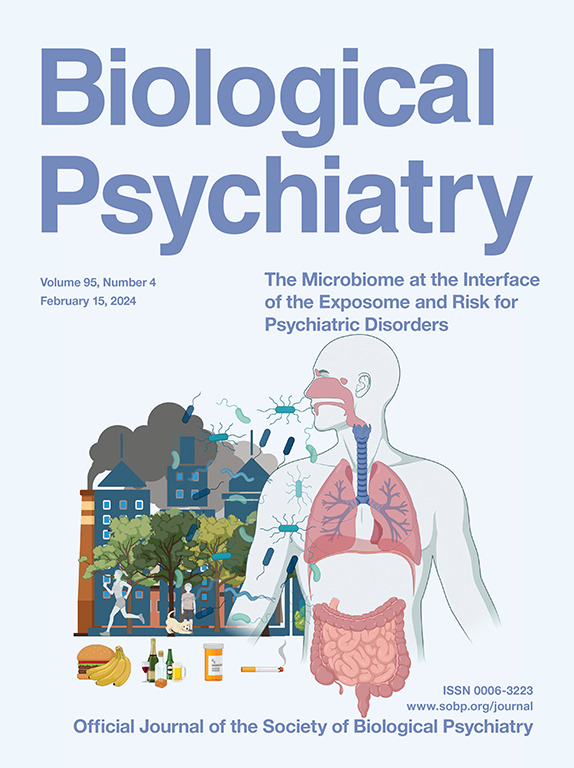重度抑郁症和强迫症患者谷胱甘肽及其相关自发神经元活动的定量分析。
IF 9
1区 医学
Q1 NEUROSCIENCES
引用次数: 0
摘要
背景:谷胱甘肽(GSH谷胱甘肽(GSH)是人脑中一种重要的抗氧化剂。尽管使用 MEscher-GArwood Point RESolved Spectroscopy(MEGA-PRESS)序列的质子磁共振波谱(MRS)受到了强烈推荐,但使用这种方法测量主要精神疾病患者大脑皮层 GSH 的文献有限:通过结合使用 MEGA-PRESS 的 MRS 和静息态功能磁共振成像,我们对内侧前额叶皮层(mPFC)和楔前区的脑 GSH 和谷氨酸进行了量化,并探讨了 GSH 水平与内在神经元活动以及健康对照组(HCs,N=30)、重度抑郁障碍组(MDD,N=28)和强迫症组(OCD,N=28)三组临床症状之间的关系:与HCs相比,MDD组和OCD组的mPFC和楔前叶的GSH浓度均较低。在高危人群中,GSH与谷氨酸水平之间以及GSH与这两个区域的低频波动分数振幅(fALFF)之间存在正相关。然而,虽然在两组患者中都不存在这些相关性,但在谷氨酸和 fALFF 值之间却显示出微弱的正相关性。此外,GSH水平分别与MDD和OCD患者的抑郁症状和强迫症状呈负相关:这些研究结果表明,GSH水平的降低以及GSH与谷氨酸之间的不平衡可能会增加氧化应激并改变神经递质信号转导,从而导致与GSH相关的神经化学物质-神经元耦合的破坏以及MDD和OCD的精神病理学。了解这些机制可以为这些疾病的潜在过程提供有价值的见解,有可能成为未来研究方向的跳板,并增进我们对其神经生物学基础的了解。本文章由计算机程序翻译,如有差异,请以英文原文为准。
Quantification of Glutathione and Its Associated Spontaneous Neuronal Activity in Major Depressive Disorder and Obsessive-Compulsive Disorder
Background
Glutathione (GSH) is a crucial antioxidant in the human brain. Although proton magnetic resonance spectroscopy using the Mescher-Garwood point-resolved spectroscopy sequence is highly recommended, limited literature has measured cortical GSH using this method in major psychiatric disorders.
Methods
By combining magnetic resonance spectroscopy and resting-state functional magnetic resonance imaging, we quantified brain GSH and glutamate in the medial prefrontal cortex and precuneus and explored relationships between GSH levels and intrinsic neuronal activity as well as clinical symptoms among healthy control (HC) participants (n = 30), people with major depressive disorder (MDD) (n = 28), and people with obsessive-compulsive disorder (OCD) (n = 28).
Results
GSH concentrations were lower in the medial prefrontal cortex and precuneus in both the MDD and OCD groups than in the HC group. In the HC group, positive correlations were noted between GSH and glutamate levels and between GSH and fractional amplitude of low-frequency fluctuations in both regions. However, while these correlations were absent in both patient groups, there was a weak positive correlation between glutamate and fractional amplitude of low-frequency fluctuations. Moreover, GSH levels were negatively correlated with depressive and compulsive symptoms in MDD and OCD, respectively.
Conclusions
These findings suggest that reduced GSH levels and an imbalance between GSH and glutamate could increase oxidative stress and alter neurotransmitter signaling, thereby leading to disruptions in GSH-related neurochemical-neuronal coupling and psychopathologies across MDD and OCD. Understanding these mechanisms could provide valuable insights into the processes that underlie these disorders and potentially become a springboard for future directions and advancing our knowledge of their neurobiological foundations.
求助全文
通过发布文献求助,成功后即可免费获取论文全文。
去求助
来源期刊

Biological Psychiatry
医学-精神病学
CiteScore
18.80
自引率
2.80%
发文量
1398
审稿时长
33 days
期刊介绍:
Biological Psychiatry is an official journal of the Society of Biological Psychiatry and was established in 1969. It is the first journal in the Biological Psychiatry family, which also includes Biological Psychiatry: Cognitive Neuroscience and Neuroimaging and Biological Psychiatry: Global Open Science. The Society's main goal is to promote excellence in scientific research and education in the fields related to the nature, causes, mechanisms, and treatments of disorders pertaining to thought, emotion, and behavior. To fulfill this mission, Biological Psychiatry publishes peer-reviewed, rapid-publication articles that present new findings from original basic, translational, and clinical mechanistic research, ultimately advancing our understanding of psychiatric disorders and their treatment. The journal also encourages the submission of reviews and commentaries on current research and topics of interest.
 求助内容:
求助内容: 应助结果提醒方式:
应助结果提醒方式:


